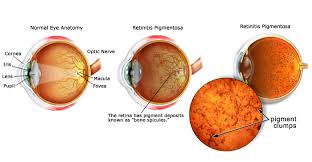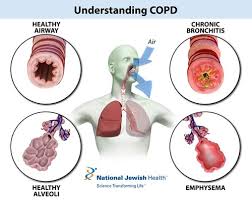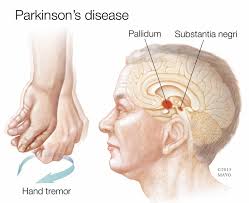Diabetes is a disease that occurs when your blood glucose, also called blood sugar, is too high. Blood glucose is your main source of energy and comes from the food you eat. Insulin, a hormone made by the pancreas, helps glucose from food get into your cells to be used for energy. Sometimes your body doesn’t make enough or any insulin or doesn’t use insulin well. Glucose then stays in your blood and doesn’t reach your cells. Over time, having too much glucose in your blood can cause health problems. Although diabetes has no cure, you can take steps to manage your diabetes and stay healthy.
Stem Cells Retinitis Pigmentosa Treatment
Retinitis pigmentosa is the name given to a group of inherited eye diseases that affect the retina. Pigmentosa causes the breakdown of photoreceptor cells. Photoreceptor cells capture and process light helping us to see. As these cells break down and die, patients experience progressive vision loss.
Effective COPD Treatment
Chronic obstructive pulmonary disease (COPD) or chronic obstructive lung disease (COLD) is an “umbrella term” that represents a host of conditions that cause obstruction of airflow inside the lungs. COPD is a progressive condition that leads to chronically poor airflow, and if not treated properly, may eventually lead to premature death.
Curable Parkinson’s Treatment
Parkinson’s disease is caused by the death of certain nerve cells in the brain. These nerve cells produce a substance called dopamine, which is, therefore, lacking in Parkinson’s disease. Dopamine is a chemical that is responsible for the normal working of the part of the brain that controls movement. The dopamine deficiency leads to the symptoms of the disease.
Stem Cells Alzheimer’s Treatment
Alzheimer’s worsens over time. Alzheimer’s is a progressive disease, where dementia symptoms gradually worsen over a number of years. In its early stages, memory loss is mild, but with late-stage Alzheimer’s, individuals lose the ability to carry on a conversation and respond to their environment. Alzheimer’s is the sixth leading cause of death in the United States. Those with Alzheimer’s live an average of eight years after their symptoms become noticeable to others, but survival can range from four to 20 years, depending on age and other health conditions.
Best Retinitis pigmentosa Treatment
Retinitis pigmentosa (RP) is a hereditary retinal disorder that causes severe vision impairment. It occurs due to the degeneration of rod photoreceptor cells in the retina, which is responsible for low-light vision. Studies have shown that mutations in certain genes may be responsible for retinitis pigmentosa.
Effective Alzheimer’s Treatment
Alzheimer’s is a progressive disease, where dementia symptoms gradually worsen over a number of years. In its early stages, memory loss is mild, but with late-stage Alzheimer’s, individuals lose the ability to carry on a conversation and respond to their environment. Alzheimer’s has no current cure, but treatments for symptoms are available and research continues. Although current Alzheimer’s treatments cannot stop Alzheimer’s from progressing, they can temporarily slow the worsening of dementia symptoms.
Best Retinitis pigmentosa Treatment
Retinitis pigmentosa is a term that refers to a group of hereditary disorders that affect the retina’s ability to respond to light. The condition primarily affects rod cells the photoreceptor cells that are responsible for night vision, seeing in dim light, and peripheral vision. Cone cells, which are responsible for color vision and seeing in bright light, may also be affected as the disease progresses.
Curable Parkinson’s Treatment
Parkinson’s disease affects the nerve cells in the brain that produce dopamine. Parkinson’s disease symptoms include muscle rigidity, tremors, and changes in speech and gait. After diagnosis, treatments can help relieve symptoms, but there is no cure for this disease.
Best Fibromyalgia Treatment
Fibromyalgia is a disorder characterized by widespread musculoskeletal pain accompanied by fatigue, sleep, memory and mood issues. Researchers believe that fibromyalgia amplifies painful sensations by affecting the way your brain processes pain signals.







